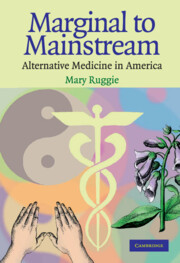Book contents
- Frontmatter
- Contents
- List of Tables
- List of Acronyms
- Preface
- 1 Introducing CAM … and the Many Questions It Raises
- 2 Understanding CAM: The Problem of Knowledge and the Power of Words
- 3 The Growth of CAM: Patterns of Use and Meaning
- 4 Physicians: Learning New Ways
- 5 Medical Research: Science and Interpretation
- 6 Investigating CAM: What Works?
- 7 The Road Ahead: Accommodation or Integration?
- Bibliography
- Index
5 - Medical Research: Science and Interpretation
Published online by Cambridge University Press: 05 June 2012
- Frontmatter
- Contents
- List of Tables
- List of Acronyms
- Preface
- 1 Introducing CAM … and the Many Questions It Raises
- 2 Understanding CAM: The Problem of Knowledge and the Power of Words
- 3 The Growth of CAM: Patterns of Use and Meaning
- 4 Physicians: Learning New Ways
- 5 Medical Research: Science and Interpretation
- 6 Investigating CAM: What Works?
- 7 The Road Ahead: Accommodation or Integration?
- Bibliography
- Index
Summary
Do herbs heal? Does acupuncture relieve pain? How do these and other modalities work? Why aren't they effective for everyone with the same condition? These questions and a host of others motivated major new research initiatives in the 1990s, most of them funded by the NIH. This research has begun the process of legitimizing CAM in American medicine. At the same time, however, certain types of CAM have become delegitimized. Some have been shown to be harmful, others useless. This chapter explores how processes of legitimation and delegitimation have evolved within the political and, most important, scientific institutions of American society. As social institutions, government and science each have distinctive sets of norms and values and both affect and are affected by their social and cultural contexts (Zuckerman 1988).
In 1991, the Senate Appropriations Committee held hearings on the use of “unconventional medicine” in the United States. The result was the establishment at the NIH of, first, an advisory panel on unconventional medical practices, and then, officially in 1992, the OAM, which began operations with a budget of $2 million. The politics behind the creation of the OAM are a classic example of the vagaries of legislative initiative, highlighting in this case the role of individuals and their personal interests. Senator Thomas R. Harkin, a Democrat from Iowa and Chair of the Appropriations Committee, had recently been converted to the benefits of alternative medicine when he used bee pollen to treat his allergies.
- Type
- Chapter
- Information
- Marginal to MainstreamAlternative Medicine in America, pp. 101 - 129Publisher: Cambridge University PressPrint publication year: 2004



